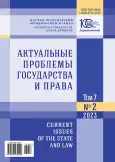Theoretical and regulatory foundations of the concept and essence of public control in the Russian Federation
- Authors: USHAKOV A.V.1
-
Affiliations:
- Derzhavin Tambov State University
- Issue: Vol 7, No 2 (2023)
- Pages: 212-219
- Section: General Theory and History of Law and the State
- URL: https://journal-vniispk.ru/2587-9340/article/view/303463
- ID: 303463
Cite item
Abstract
We consider such a dynamically developing institution as public control, an attempt has been made to generalize various scientific approaches to its definition in conjunction with the analysis of the regulatory foundation, including the one fixed at the level of the Constitution of the Russian Federation. The relevance of chosen topic and the degree of its scientific development are revealed. The importance of public control in the context of democracy is substantiated. During the analysis of theoretical views on the definition of public control, a variety of views on its concept is noted, which, despite some differences in focusing on certain nuances, are largely similar in determining the very essence of this legal institution. At the same time, it is impossible to deny the existence of problems within the framework of legal regulation of this type of control, which is manifested in its unsystematic nature. It is concluded that the regulatory framework of public control began to form long before the adoption of a special legislative act in 2014, and at the moment the essence of public control, its goals, principles, tasks, and main subjects are defined at the legislative level. The existing legal framework of public control creates a solid basis for its implementation, at the same time, the procedures for conducting public control are not without drawbacks and require additional legal regulation that meets modern realities.
Keywords
About the authors
Anton V. USHAKOV
Derzhavin Tambov State University
Author for correspondence.
Email: antonushakov-aspirant@mail.ru
ORCID iD: 0009-0005-4016-9622
Post-Graduate Student, Theory and History Department of Law and National Security Institute
Russian Federation, 33 Internatsionalnaya St., Tambov, 392000, Russian FederationReferences
- Matuzov N.I. (1972). Lichnost’. Prava. Demokratiya. Teoreticheskie problemy sub”ektivnogo prava [Personality. Rights. Democracy. Theoretical Problems of Subjective Law]. Saratov, Saratov State University Publ., 292 p. (In Russ.) Available at: https://search.rsl.ru/ru/record/01007359771
- Romanovskii G.B. (2001). Pravo na neprikosnovennost’ chastnoi zhizni [Right to Privacy]. Moscow, MZ-Press Publ., 309 p. (In Russ.) Available at: https://search.rsl.ru/ru/record/01000746979
- Lyubashits V.Ya., Mamychev A.Yu. (2015). Mekhanizm gosudarstva kak institutsional'naya osnova obespecheniya prav i svobod cheloveka i grazhdanina [The mechanism of the state as an institutional basis for ensuring the rights and freedoms of man and citizen]. Advances in Law Studies, vol. 3, no. 6-18, pp. 279-289. (In Russ.) https://doi.org/10.12737/16368, https://elibrary.ru/vkcedt
- Afanas’ev V.G. (1973). Nauchnoe upravlenie obshchestvom (opyt sistemnogo issledovaniya) [Scientific Management of Society (Experience of System Research)]. Moscow, Politizdat Publ., 391 p. (In Russ.) Available at: https://search.rsl.ru/ru/record/01007238585
- Zabralova O.S. (2012). Razvitie obshchestvennogo kontrolya v sfere deyatel’nosti organov ispolnitel’noi vlasti Rossiiskoi Federatsii: avtoref. dis. … kand. yurid. nauk [Development of Public Control in the Field of Activities of the Executive Authorities of the Russian Federation. PhD (Law) diss. abstr.]. Moscow, Institute of State and Law of the Russian Academy of Sciences Publ., 26 p. (In Russ.) https://elibrary.ru/qfttbj
- Kolomyttseva O.N. (2007). Kontrol’ obshchestva nad gosudarstvom: avtoref. dis. … kand. yurid. nauk [The Control of Society over the State. PhD (Law) diss. abstr.]. Nizhny Novgorod, Nizhny Novgorod Academy of the Ministry of Internal Affairs of the Russian Federation Publ., 34 p. (In Russ.) https://elibrary.ru/niwaer
- Komkova G.N., Berdnikova E.V. (2019). The object and subject of public control in the Russian Federation: theoretical and legal issues. Rossiiskoe pravo: obrazovanie, praktika, nauka = Russian Law: Education, Practice, Research, no. 4 (112), pp. 11-19. (In Russ.) https://doi.org/10.34076/2410-2709-2019-4-11-19, https://elibrary.ru/ppsgry
- Starchikova V.V. (2014). Obshchestvennyi kontrol’ v pravovom gosudarstve: teoretiko-pravovoe issledovanie: avtoref. dis. … kand. yurid. nauk [Public Control in the Rule of Law: Theoretical and Legal Research. PhD (Law) diss. abstr.]. Moscow, Russian Presidential Academy of National Economy and Public Administration Publ., 27 p. (In Russ.) https://elibrary.ru/zpkfsl
- Zubarev S.M. (2011). Ponyatie i sushchnost’ obshchestvennogo kontrolya za deyatel’nost’yu gosudarstvennykh organov [The concept and essence of public control over the activities of state bodies]. Administrativnoe pravo i protsess = Administrative Law and Procedure, no. 5, pp. 7-13. (In Russ.) https://elibrary.ru/nulgjf
- Yapryntsev I.M. (2018). Obshchestvennyi kontrol’ v sisteme grazhdanskikh initsiativ v Rossiiskoi Federatsii: konstitutsionno-pravovoe issledovanie: avtoref. dis. … kand. yurid. nauk [Public Control in the System of Civil Initiatives in the Russian Federation: Constitutional and Legal Research. PhD (Law) diss. abstr.]. Moscow, Kutafin Moscow State Law University Publ., 26 p. (In Russ.) Available at: https://viewer.rsl.ru/rsl01008709622
- Yarmots E.N., Rudis A.S. (2017). Concept and signs of public environmental control. Vestnik Polotskogo gosudarstvennogo universiteta. Seriya D. Ekonomicheskie i yuridicheskie nauki = Herald of Polotsk State University. Series D. Economics and Law Sciences, no. 6, pp. 175-179. (In Russ.) https://elibrary.ru/zulaoj
- Grib V.V. (2015). Current problems of legal development of the institute of public oversight in the Russian Federation. Konstitutsionnoe i munitsipal’noe pravo = Constitutional and Municipal Law, no. 11, pp. 24-27. (In Russ.) https://elibrary.ru/unswht
Supplementary files








